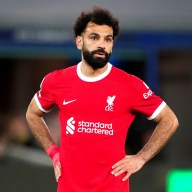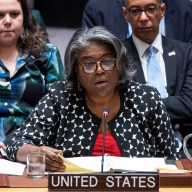LONDON – Desperate but divided on ways to lift their countries from economic misery, world leaders converged for an emergency summit Tuesday holding scant hopes of finding a magic-bullet solution for the crisis that brought them hurrying to London.
Prime Minister Stephen Harper arrived Tuesday evening, as did U.S. President Barack Obama and others.
Even as the leaders were arriving, the United States acknowledged its allies would not go along with a massive burst of stimulus spending, while Europe was forced to backpedal from hopes for tighter financial regulation.
Instead, leaders are trumpeting the limited common ground they could reach, including more money for the International Monetary Fund and closer scrutiny of hedge funds and tax havens. As for the broader issues, they’re hoping for the best, or at least that they will do no harm.
With turbulent world markets watching closely, the stakes are high, especially for the new U.S. president, stepping onto the world stage for the first time to deal with the economic crisis and to meet face-to-face with many other leaders.
One global change is being acknowledged: The forum for grappling with world economic problems has grown beyond the established eight post-war economies that dominated previous economic summits: the United States, Britain, Germany, France, Japan, Canada, Italy and Russia.
Now, 20 countries are coming together in London, with fast-growing developing economies such as China, India, Brazil and Saudi Arabia – important players in any effort to co-ordinate economic policy – sitting as full negotiating partners.
“For the first time, there’s a recognition that major emerging markets and developing countries have a critical role at the table,” said Mike Froman, a White House international economic adviser.
But will that mean action to stop a global downward spiral?
Froman acknowledged that there have been few examples of international gains in times of crisis. “The depression was made ‘great’ by the lack of co-operation,” he said, noting that countries like to keep control over their own fiscal and monetary policies.
And global leaders were quarrelling up to the last minute before the summit.
Adding to the pressure, French President Nicolas Sarkozy said Tuesday the leaders cannot afford to let the week pass without making substantial progress in fixing the world’s economy.
“We have to obtain results, there is no choice, the crisis is too serious to allow us to have a summit for nothing,” he said.
European countries are pushing for a tougher regulatory system for global finance, while the United States is emphasizing more spending, an idea that holds little interest for Europeans wary about debt.
Canada hopes to play a role in bridging the gap between countries. Harper has an audience and luncheon with the Queen on Wednesday before the summit gets underway. Summit partners will meet for dinner on Wednesday evening.
The main G20 talks take place Thursday, after which Harper travels to Germany and France for NATO’s 60th anniversary summit.
The world economy is in far worse shape than when the group of rich and developing countries last met in November and set lofty goals for international co-operation.
Trade is deteriorating, protectionism is on the march and joblessness is rising. Street demonstrations have increased, and widespread protests are expected in London this week.
World Bank President Robert Zoellick called for the G20 to back a US$50 billion liquidity fund to keep global trade moving. In rich countries, he said, “people talk of bonuses or no bonuses. In parts of Africa, South Asia and Latin America, the struggle is for food or no food.”
London does not have a good history for successful economic summits. One held in London in 1933, attended by more than 1,000 world leaders and financial officials – although not U.S. President Franklin D. Roosevelt – met for six weeks and then gave up.
Still, most leaders were upbeat Tuesday as they headed to London.
Harper told Fox News on the weekend that Canada is “emerging from this (recession) with probably the only truly free-market financial system in the world.”
That’s a result of Canada’s conservative and relatively heavily regulated banking sector. Harper pressed home the point Monday in an interview with CNN.
“A few years ago Canada was being criticized, we didn’t deregulate as much as some others but right now the government is not running all or part of the financial sector as is the case with some many systems.”
Four of the top 10 banks in North America now are Canadian, as are five of the top 50 in the world, Harper said.
Canada’s banking stability has earned it a significant role at the G20, where Canada co-chaired a working group with India on strengthening international financial regulation.
A draft of the communique circulating ahead of the meeting suggested that global leaders will embrace stimulus spending totalling about $2 trillion. But that includes a number of measures already announced.
Leaders of European countries, led by Germany’s Angela Merkel, continued to resist calls for more stimulus and for printing money as the U.S. Federal Reserve and the Bank of England have done to try to jump-start a recovery.
– With files from The Canadian Press.
















